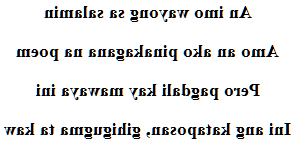Surigaonon love poem
Salamin
An imo wayong sa salamin
Amo an ako pinakagana na poem
Pero pagdali kay mawaya ini
Ini ang kataposan, gihigugma ta kaw


→ French poem ←
Surigaonon language
Surigaonon (Surigao, Jaun-Jaun, Waya-Waya, Sinurigao) is a Malayo-Polynesian language that speak 400,000 people.
Surigao, a southern bisaya language, spoken in Surigao del Norte, mainly in Surigao del Sur, and in some parts of Agusan del Norte, Agusan del Sur, and Davao Oriental, is officially recognized in the Philippines as a regional language. This language is very close to Tausug.
Although neighbors and mutually influenced, the Surigaonons form a distinct group from the Cebuanos.
The proximity between these two peoples and their languages, and the fact that a large number of Surigaonons are bilingual with Cebuano, could have been misleading, and, it must be admitted, that Surigaonon is a language distinct from Cebuano; their characteristics, and linguistic properties, are different, and cebuano and surigaonon, are not mutually understandable.
Moreover, Surigaonon is distinguished from other Visayan and Mindanao languages, by its own sound, for its consonants and vowels.
In Surigao del Norte, the number of speakers of surigaonon, is only decreasing, because Cebuano, English and Tagalog, which are used in schools, in the media and the administration, leave to the surigaonon, as a social space, only oral, for family or friends communications.
So the surigaonon, is less spoken, and also sidelined by these three great languages, which occupy more prestigious spaces ... and little by little, it tends to become a secondary language for the Surigaonons; so, welcome the initiative of surigaonon websites, which try to maintain the language by putting speakers in contact.
Surigaonon People and the girl
This little love poem in surigaonon, is translated by Joy ... this translation, comes from Davao in the Philippines.
The Surigaonons are Bisayas, who live on the eastern coastal plain of Mindanao. Like the other Bisayas, they come from southern China, which they left in the Iron Age.
Today, the girl of my poem is from Davao, and it is my words that she hears, on morning and evening, when she ties or unties her hair, watching herself do it!
Cebuano